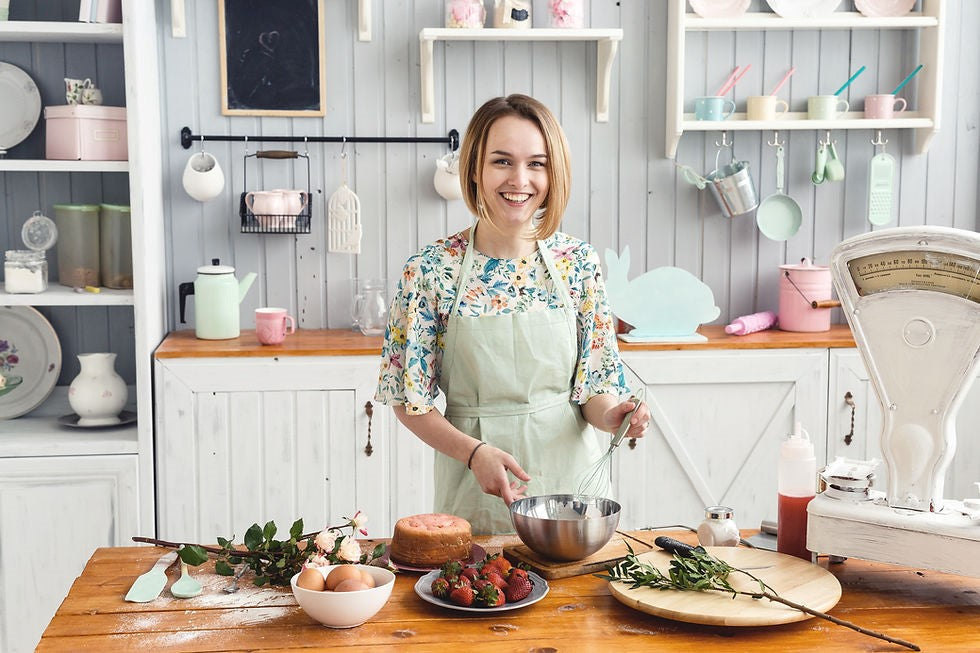The Essential Guide to Choosing the Perfect Cooking Apron
Cooking is more than just a daily task; it’s an art form, a passion, and also for many, a remedial task and activity. Whether you are a professional chef or a dedicated home chef, the right apron selection can elevate your cooking experience. An excellent cooking apron is essential among this cocking experience. We understand the importance of different aprons, and we are here to guide you through the process of choosing the perfect cooking apron.
Why a Cooking Apron is Essential
It's important to understand the importance of an apron as a necessary component of any chef's uniform before going into the details of choosing apron.
1- Protection
Wearing a proper apron protects your clothing from splashes, stains, and splatters, particularly while handling materials like flour, oils, or tomato sauce. It acts as a barrier, ensuring that your clothing remains clean and neat.
-
Hygiene
The risk of food contamination is decreased while wearing an apron in the kitchen, which promotes hygiene. For both beginner and expert chefs, it forms a layer between your clothing and the meal.
3. Convenience
Modern aprons frequently come equipped with pockets and loops, providing appropriate storehouse for instruments, towels, and even for your phone. These features allow you to keep your hands free and the equipment close at hand. -
Professionalism
A well- designed apron can enhance your appearance, making you look more professional and appropriate whether you are cooking at home for friends and family or working at commercial places.
Key Features to Remember When Choosing an Apron
A few important factors for selecting a leather cooking apron will greatly improve your cooking experience. Here are the most important factors which should keep in mind.
1. Material
An apron's material composition has a significant impact on its comfort, durability, and fit for various cooking activities. Here are a some outfits which are used.
Cotton
Cotton aprons are lightweight and easy to clean. They provide a soft, comfortable fit and are perfect for baking and mild cooking.
Polyester
Polyester aprons are long-lasting and resistant to stains and wrinkles. They fit comfort and functionality, making them suitable for a variety of kitchen activities. They are often made with silk.
Jeans
Jeans aprons are a strong and fashionable choice for individuals seeking a durable and lasting outfit. Although they can be thicker than cotton or polyester aprons, they provide good protection.
Leather
Leather wealding aprons show elegance and are extremely durability, making them ideal for many chefs. They provide unmatched protection and style, but in order to maintain their appearance, they require to be proper care.
Canvas
These are thick and durable, which are ideal for demanding kitchen activities. They're frequently treated to be water- resistant, adding an extra layer of protection.
-
Fit and Comfort
An leather apron for cooking should be comfortable to wear for long periods of time and fit properly. When selecting the fit, take these factors into account.

Adjustable Straps
To ensure a tight and comfortable fit, look for aprons with neck and waist straps that are adjustable. You can fit the apron to your exact body type and size thanks to the adjustable strips.
Length and Coverage
Choose an apron that provides suitable coverage based on your cooking needs. Half aprons are lighter and less constricting, making them perfect for less filthy tasks, while full-length aprons provide the finest protection from the chest to the knee.
Weight
Make sure the apron's weight is appropriate for the meals you prepare. While thicker aprons are ideal for grilling and other more demanding cooking duties, lighter aprons work well for baking and light cooking.
-
Design and Style
An apron's style and design are important as well as efficient. Here are some design important to consider.
Pockets
Pockets add comfort by providing space to hold equipment, recipes, or even your phone. For optimal utility, think about how many pockets you need and where to put them.
Colors and Patterns
Choose colors and designs that go well with your style and kitchen's decor. While strong hues and patterns can make a statement, classic colors like black, white, and navy are adaptable.
Personalization
Numerous brands, such as Dorus Leather, provide personalization choices related to monograms or logos. Customizing your apron can give it a special touch and make it completely your own choice.
-
Maintenance
Consider about how simple it is to keep and clean the apron. Here are some tips for different materials.
For Polyester and Cotton
- Washable in a machine
- The majority of aprons made of cotton and polyester may be machine washed, making maintenance simple.
-
Resistance to Stains
To keep your aprons appearing brand new, seek for ones with a stain-resistant surface. -
Pressing
If necessary, iron on low heat to keep the appearance crisp.
For Denim
- Cold Water Wash
To avoid shrinking, wash denim aprons in cold water.
- Mild Detergent
Use a mild detergent and avoid bleach.
- Drying
Hang to dry or spin dry on low heat. If necessary, iron on medium heat.
For Leather
- Cleaning
To clean, use a sticky cloth to wash. For a deeper thorough cleaning, use a leather detergent.
- Conditioning
To keep the apron looking nice and lasting, use leather conditioner on a regular basis.
- Storage

Keep out of direct sunlight and dampness. Keep in a cool, dry place.
Types of Aprons
Aprons come in a variety of forms to fit different needs and cooking styles. Here are some common types.
1. Bibs
The most popular kind of aprons are bib aprons, which give a complete coverage from the chest to the knee or lower. They usually contain different pockets and are equipped with adjustable neck and waist straps. They can handle almost every cooking task and are adjustable in fittings.
-
Waist Aprons
Waist aprons, often called half aprons, cover the thighs and tie around the waist. They're lighter and more comfortable, ideal for baking, waiters, or light cooking tasks.
3. Cross-Back Aprons
Straps on cross-back aprons cross at the back to evenly distribute the weight over the shoulders. Professional cooks often choose this design since it is more comfortable for prolonged wear.
4. Pinafore Aprons
Pinafore aprons, also known as smock aprons, offer full covering environment to clothes and are worn like a dress, with straps over the shoulders. They give great protection and are stylish, mostly used in bakeries and cafes.
Choosing the Right Apron for Your Needs
The ideal apron for you will rely on your tastes and unique needs. Here's a guide to help you choose with style.
-
Home chefs
An adaptable, comfortable, and simple to clean apron is important for home cooking. The ideal bib apron is made of cotton or polyester and has adjustable straps and pockets. Select a design that goes with the specific style and décor of your kitchen. -
Professional Chefs
Aprons for professional chefs need to be comfortable, long-lasting, and useful. Durable materials like leather or denim make wonderful cross-back or bib aprons. Seek for aprons with several pockets and think about adding personal touches.
-
Bakers
Bakers frequently prefer waist aprons for their lightweight and comfortable design. The best aprons are made of cotton or canvas and include lots of pockets for tools and recipes. To make your baking sessions happier, choose a cheerful touch to your baking sessions.
-
Grill Masters
A strong, protective apron is necessary when grilling because it can get messy. Bib aprons made of leather or sturdy canvas provide superior protection and style. Ensure the apron has pockets for holding grilling tools and an adjustable fit.
Care and Protection for Your Apron
Proper care can extend the lifespan of your apron and keep it looking its stylish. A few tips for are following.

- For Cotton and Polyester Aprons
- Machine Wash
Use a moderate detergent and either warm or cold water to wash.
-
Drying
The drying process should be on low heat or air dry. - Ironing
If necessary, iron on low heat.
- Denim Aprons
- Wash
To avoid shrinking, wash in cold water.
- Detergent
Gentle Cleaner Instead of using bleach, use a mild detergent.
- Drying
Drying Hang to dry or spin dry on low heat. If necessary, iron on medium heat.
- Leather Aprons
- Cleaning
Wipe with a damp cloth to clean.
- Conditioning
Regularly use leather conditioner.
- Storage
Keep out of direct sunlight and moisture.
Summary
In conclusion, getting the ideal balance between comfort, effectiveness, and style is key to selecting the ideal cooking apron. To make sure that your apron not only shields your clothing from damage in the kitchen, but also reflects your distinctive personality, take into factors like material, design, fit, and personalization. If you explore carefully, you can find an apron that improves your cooking experience and gives you a polished, self-assured feeling each time you enter the kitchen.
FAQ’s
-
Why is it the important to wearing a cooking apron in kitchen?
In addition to protecting your clothes from stains and spillage, a cooking apron promotes and helps to hygiene by lowering the possibility of food contamination, offers pockets and loops for your ease, and increases your level of professionalism in the kitchen.
2. Which are the most important factors to think about while choosing the cooking apron?
Important things to take into account are the apron's material, design and style features like pockets and customization options, fit and comfort, and housekeeping needs specific to the material. -
Which types of cooking aprons are available?
Cooking aprons are available in a variety of different styles, such as waist aprons for easier work, bib aprons for complete covering, cross-back aprons for comfort during long time use, and pinafore aprons for an attractive look and full coverage.
4. How can I choose the ideal apron for my own specific requirements?
Think on your own needs and preferences, just as you would if you were home cook, a professional chef, or grill master. Select an apron that fits well into body and is long lasting, and is suitable for what tasks you will be carrying out in the kitchen. -
How should I can maintain my cooking apron?
The material of your leather aprons defines how to maintain and care for it. Machine wash aprons made of polyester and cotton with a mild detergent, and then let them air dry or dry spin them on low heat. Denim aprons should be air or low heat dried after being cleaned in cold water with a little of detergent material. Blacksmith leather aprons need to be stored away from sunlight and moisture, wash and cleaned with a damp cloth on a regular basis.
Releated Articals:

